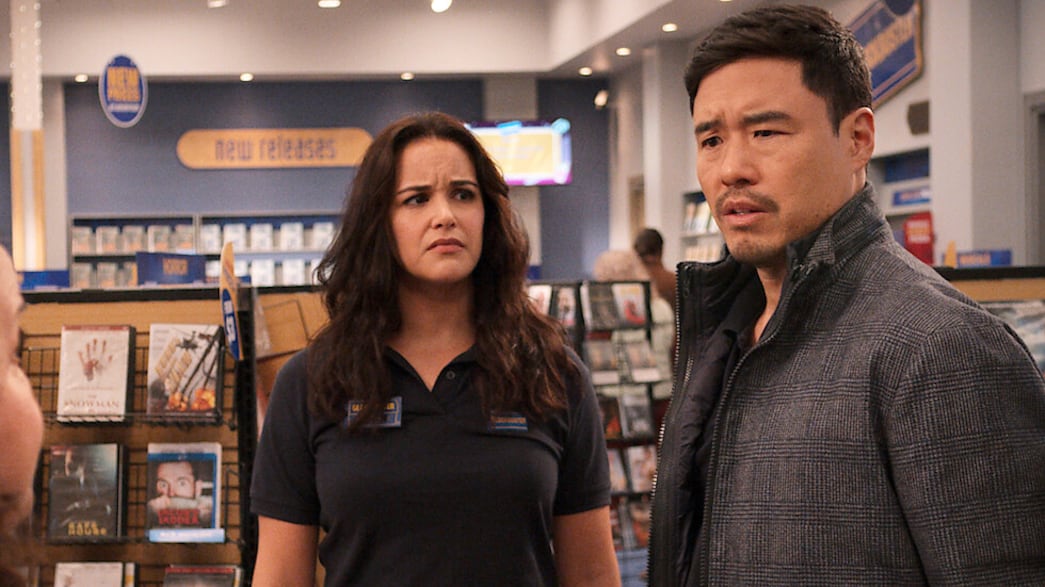Within the first few minutes of Netflix’s new original series Blockbuster—which is inspired by the eponymous video rental empire—store manager Timmy (Randall Park) takes a fateful call from corporate HQ. That’s how he learns that Alaska’s last few Blockbuster outposts have fallen and that the company is entering bankruptcy.
Eventually, Timmy relays the bad news to his employees. The staff includes Eliza (Melissa Fumero), the object of Timmy’s unrequited affections, budding auteur Carlos (Tyler Alvarez), fresh-faced naif Hannah (Madeleine Arthur), lonely senior Connie (Olga Merediz), and Kayla (Kamaia Fairburn), the teenage daughter of Timmy’s best friend and landlord Percy (J.B. Smoove), who also happens to be a failing party store magnate.
In other words, counting Timmy, there are seven people who defy an industry’s twilight and continue to operate the store, waiting each day in the hopes of serving the occasional customer. Maintaining a video business in 2022 was always going to nudge eccentric, but Timmy’s business model veers toward the clinically insane.
To be clear, the series takes place in an entirely different universe from the Bend, Ore., success story chronicled in the documentary The Last Blockbuster (the sitcom is set in Michigan). Though both ostensibly cover the same central dilemma, a fictionalized extrapolation of the documentary would be less madcap comedy than Hallmark Christmas fare.
The Last Blockbuster has perhaps colored memories of the trade. Lord knows, it’s gratifying to learn that the sole remaining franchise chugs forward because the proprietress held genuine concerns for her workforce. This was not, if needs be said, always the industry norm.
Evidently, should the last Blockbuster be situated in a lovely corner of a thriving tourist mecca and link itself with the surrounding artistic community, more than enough money can be made by hawking merchandise advertising their own survival. Transplant the business from a picturesque resort town to the dying Rust Belt minimall of the sitcom, however, and things seem far more bleak.
Park does his damnedest to charm his way through a woefully amorphous role (Timmy is essentially a dankest-timeline version of Park’s steakhouse-helming Fresh Off the Boat pater familias). Nothing is especially compelling about the character’s amiable wistfulness, but the torch Park carries deserves a better spark than Fumero’s damp kindling. As a regretful Ivy League dropout married too young, she attacks every line with the same manic intensity of her adorably anal Brooklyn Nine-Nine detective to wearying ends.
Despite the fact that they spend all their days waxing cinematic, the employees don’t really seem to like movies. It’s peculiar, given that once upon a time, video clerks sold themselves as gatekeepers to a glimmering realm at the moment our entertainment industrial complex began producing so many titles that simply keeping track of what one wanted required professional assistance.
For a certain sort of media-oversaturated trash-culture maven, this was their long-awaited turn in the spotlight—vindication after all the unloved and underpaid years of bloody-minded insistence on absolute certitude—before the heavens opened and web forums made god-trolls of us all. Yet Blockbuster suggests Timmy’s generation might well continue fighting the inevitable, rewound ceaselessly into the past.
An undercurrent of economic disquiet burbles through the first seven episodes of Blockbuster, before finding ecstatic fruition in a delirious finale that very nearly saves a disappointing first run and teases what could be for the yet to be renewed series should creator and co-executive producer Vanessa Ramos (Brooklyn Nine-Nine, Superstore) embrace the giddy nihilism at its core.
In the last episode, solar flares spike communication satellites on Christmas Eve, and a local populace bereft of internet programming descends into madness, rushing to the sole source of analog distraction. In the land of the offline, unhinged spectacle showcases the screwball potential of likable characters untethered to any semblance of life as lived.
To put it simply, Blockbuster once again becomes king of kings. Look upon its works, audience, and giggle.
SEE IT: Blockbuster streams on Netflix.
